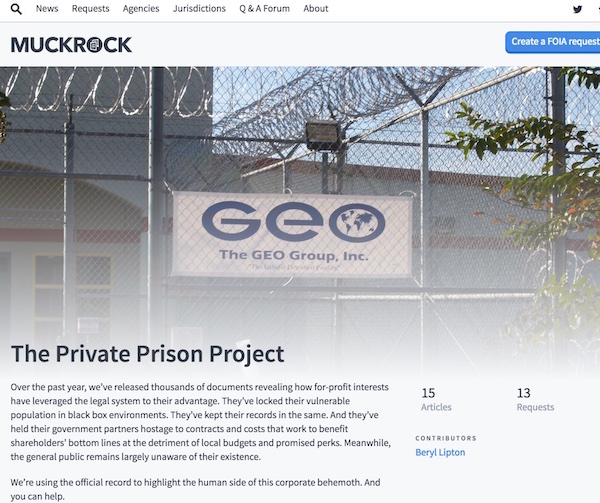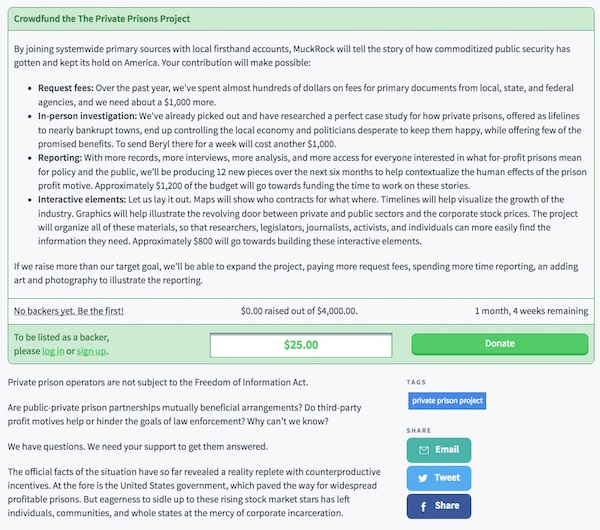
For the past year, Beryl C.D. Lipton has been investigating the private prison system in the United States. She’s a reporter for MuckRock, a news site that covers government transparency issues and also helps its users access government documents.
Lipton has filed about 1,000 Freedom of Information Act requests, and she plans to visit some prisons to continue her reporting.
But between travel costs and fees for records requests, the type of reporting that Lipton is doing is expensive. And readers who are interested in following her work may have difficulty keeping track of all the different requests she’s made and documents she’s uncovered.
To address these concerns, MuckRock plans to debut two new features on Thursday that will make it easier for users to follow specific stories and contribute to reporting costs.

“Up until now, you could launch a crowdfunding campaign for an individual request,” Michael Morisy, MuckRock’s co-founder, told me. “But now users will also have the option of organizing those requests and explaining the meat of the story and what they need to get the story done.”
MuckRock is also launching MuckRock Projects, which will let journalists and others using the site organize related FOIA requests and follow specific projects.
Lipton’s project will be the first to make use of these tools, but Morisy said other groups will be signing on soon.
Both the project site and the crowdfunding system were designed to make it easier for journalists to focus on their reporting.

“Reporters are really good at telling a coherent narrative, but they can be really bad at showing off their own work, and we want to make that easier,” Morisy said. “If you look at a 10,000-word story … so much of that work is behind the scenes, and we want to make that apparent to the dedicated audience, the people who are excited to get to the nitty-gritty. Reporters don’t have time to go through constant updates, so we’re handling it for them.”
The journalists and news organizations that use MuckRock’s crowdfunding platform will be able to publish the resulting stories wherever they like, not just on MuckRock.
Morisy said the company is also looking into adding a Kickstarter-like reward mechanism that would let publishers offer incentives for people to donate. But crowdfunding campaigns that have already run on the site — such as an effort to get documents about Boston’s ultimately failed bid for the 2024 Olympics — didn’t need to offer trinkets to secure donations.
“It’s kind of amazing that people didn’t really want incentives,” Morisy said. “They knew where their money was going, and that was a huge reward for them, knowing that they were funding journalism.”
To that end, MuckRock Projects will give readers — both donors and non-donors — more ways to follow up on issues they care about. Each project page will have a summary detailing the basics of the reporting that’s been done, and will showcase documents relevant to the story.
Many of MuckRock’s users aren’t journalists. Activists, for instance, also use the site (for example, members of the Black Lives Matter movement have made FOIA requests there), and they wanted ways to showcase their work and develop an audience without having to write accompanying news stories. One group, for instance, took advantage of MuckRock’s tagging system by telling users to look up specific tags to see all of the documents it had requested.
“A tag page was okay, but it lacked context,” Morisy said. “So we asked those types of users what they needed to help those documents make the biggest possible impact.”
Users can now follow stories and get updates via email when a story is published, when a document request is filed, and when new documents are received. Right now, those are the only types of actions you can follow, but MuckRock is looking at expanding its offerings.
“You could send people updates that say, ‘Hey, the police department got back on this request, and said they’re working on it, it’s going to be two weeks,'” Morisy said. “For people who really want to know every nitty gritty detail … we’re going to make it very easy for them to subscribe.”